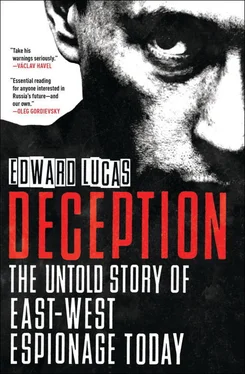Had they known five years ago the result of their scheming, the perpetrators would surely have decided to pick another target. It is hard to see now what will stop Mr Browder’s formidable campaign against the sixty people he accuses of benefiting from the fraud, or of complicity in Mr Magnitsky’s death. 16The European Parliament has voted to ban them from the European Union; Canada’s parliament has proposed a similar resolution and it has passed in the Netherlands. More than twenty American senators have backed legislation banning these individuals from the United States, provoking a furious response from the Russian authorities.
While Mr Browder has shed his reputation as a grandstanding wheeler-dealer for that of an inspirational leader of a moral crusade, the Russian authorities’ response to the case has been a textbook study in how not to handle a tricky issue. As in so many episodes, from the mysterious apartment-block bombings in 1999 17to the looting of Yukos, they have made their case spectacularly poorly, with a mixture of paranoid silence, bluster and deceit. The best place to test all these claims would be in court, with proper lawyers on both sides and a fair judge in the middle. That does not seem likely to happen. Overall, while some officials have condemned Mr Magnitsky’s treatment, others have implied that he deserved it, and others still have made counter-allegations. When, prompted by Mr Browder’s researchers, the Swiss authorities opened a money-laundering investigation into accounts at Credit Suisse, the bank that handled many of the transfers benefiting those implicated in the case, the Russian authorities launched a clumsy attempt to summons Mr Browder for questioning in Moscow (understandably, he has declined to go). Credit Suisse says it is co-operating with the investigation.
The genesis, course and aftermath of this case exemplify the weakness of the bits of the Russian system that should constrain the powerful and protect the innocent. Appeals to politicians either went unanswered or brought ineffective responses. Russian voters clearly care about the case and believe that an injustice was done. But the political system offers no way to resolve their concern. Attempts to use the parts of the state machinery that offer redress to wronged citizens got nowhere. Civil-society organisations tried to raise the case, but without success. The media barked – bravely in some cases – but could not bite. Only external pressure, belatedly, has inconvenienced the people behind the fraud and murder, who are now (in some cases) unable to travel freely to the West.
The case is a concentrated episode in a much wider story: the ex-KGB’s abuse of power, including murder and looting. The FSB – its main successor organisation – has tried and trusted tools for intimidating individuals and for misusing the instruments of state power to create an alternative reality, in which the innocent are the guilty and justice serves the state’s interest, not the public one. The FSB acts as the Russian regime’s enforcers, punishing the brave and bullying the cowardly in order to head off any credible political or economic challenge. In return, it has a licence to loot, using both the tools of espionage and a veneer of legality in which criminal actions have the force of law. It has placed its trusted officers in parts of the state apparatus that are supposedly independent: public, governmental, or judicial bodies. Hermitage researchers are convinced, for example, that Kuznetsov, nominally an official of the Interior Ministry, is in fact an FSB officer, making sure that his masters’ interests are served there; also in the FSB, they believe, are the people in the Moscow city tax department who supervised the bogus refund (which was by no means the first of its kind). The ultimate blame for Mr Magnitsky’s death reaches even higher than those named here. At the head of the scam, says Hermitage, were top Russian officials including a government minister with a close friend who is a senior official. An analogy comes from the real-estate business: the most senior official is the ‘landowner’; he cuts in a ‘property developer’ to construct the scam, who then buys in whatever brain and muscle-power is needed. The profits from this ‘project’ pay off any troublesome outsiders.
The system that perpetrated the crimes described in this chapter is the epitome of the Russian state machine today. The story of Sergei Magnitsky is not just a human tragedy; it is a political parable. His fate may help calibrate the reader’s moral compass in the pages ahead, which deal with events past and present outside Russia. The people responsible for his death in prison are the heirs of the Soviet KGB, and colleagues of Russia’s present-day spymasters.
Many find it easy to be blasé about Russian spies. Espionage is a grubby business always and everywhere. Spies’ political masters in many countries deploy them for bad reasons as well as high ones. Why are the Kremlin’s lot worse than anyone else’s? For all its undoubted flaws, Russia today is not a totalitarian superpower with ambitions for world domination. Its intelligence agencies are decades away from the mass murderers of the old KGB. Even the Cold War did not deserve the moral clarity that some of its Western protagonists liked to maintain. Indeed, as I myself show in later chapters, cynicism and incompetence blot the record of British and American intelligence in Eastern Europe. For all these reasons, many would argue, it is surely time to grow up, and keep the tiresome but ultimately anachronistic phenomenon of Russian espionage in proper proportion?
A proportionate response is indeed merited. But it should be tougher, not softer, than the West’s current stance. As Sergei Magnitsky’s story shows, the dark threads of murder and mayhem that started with Lenin’s Red Terror after the Bolshevik revolution in 1917 continue to the present day in the heart of Russia’s bureaucracy, with officials swindling their own taxpayers out of a fortune, and then killing the man who tried to expose their misdeeds. The next chapters explain the origins of the corrupt autocracy that rules Russia’s mafia state, its aims, and then its activities in our midst.
The story of Sergei Magnitsky should be a wake-up call to the outside world, revealing the true nature of the regime in Russia. But outsiders have systematically (and in some cases wilfully) misread events since 1999, when the chaotic but pluralist era of Boris Yeltsin gave way to the corrupt and authoritarian rule of the ex-KGB hard men – the Siloviki . Telling the real story of these men’s doings is hard and even dangerous. For Russia’s self-censoring mainstream media, no-go areas include Mr Putin’s private wealth, his sexual preferences, and the mysterious ‘terrorist’ bombings of autumn 1999 that stoked public anxiety, making the unknown stopgap prime minister a shoo-in for the presidency. It is often forgotten that Mr Putin arrived on the national stage as a political cipher: a quiet, grey, timid-looking man, blinking nervously in the unaccustomed limelight. He was the fifth prime minister in the space of twelve months: many at the time thought, wrongly, that his stint in office would be equally brief (as we will see later in the book, the outward appearance of mediocrity can be dangerously deceptive). Now the media admiringly portray Mr Putin and his colleagues as chaste, brave (and in his case virile) guardians of the national interest, not brutes or swindlers. Privately, few Russians believe these political arrangements are fair or efficient. But they see no way of changing them.
That reflects the contradiction at the heart of Russian public life. The twelve years of the ex-KGB regime has brought not the promised transformation to order and modernity, but only a sleazy stability. Corruption and incompetence mean that public services are still dire, despite the billions squandered on them. The result is demoralising and tiresome. Many of the brightest and best Russians yearn to live and work abroad. But at home, few see any alternative to Mr Putin and his colleagues. Whatever their shortcomings, in the view of many Russians, they are the least bad option – certainly better than the uncertainties and humiliations of the 1990s.
Читать дальше












